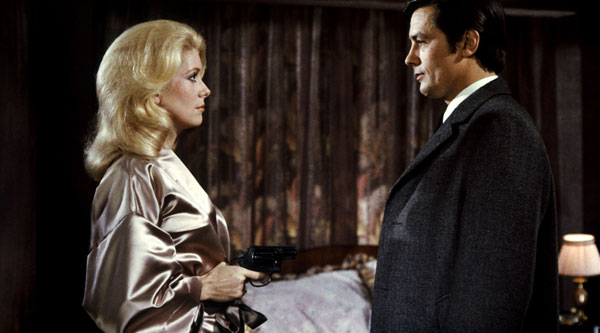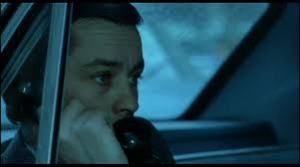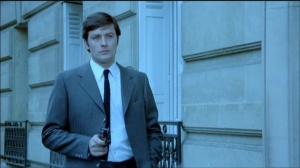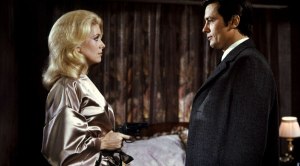“Les seuls sentiments que l’homme ait jamais ete capable d’inspirer au policier sont l’ambiguite et la derision…” -Francois-Eugene Vidocq
This 1972 French film noir Un Flic (Dirty Money) isn’t just another one of those ‘ole French films, as a matter of fact, nothing Jean-Pierre Melville did was like that, and this one’s no exception. Alain Delon, Catherine Deneuve, Richard Creena, Ricardo Cucciolla, Michael Conrad and Paul Crauchet lead us into this thriller. Almost considered silent cinema, Melville’s master techniques of reaction shots creating suspense, instead of its dialog, made him a major influence in the French New Wave movement. This Parisian film noir is at its best.
“Every afternoon at the same time I’d start my rounds with the Champs Élysées…I started well before nightfall, but it wasn’t until later, when the city slept, that I could really get to work. My name is Edouard Coleman.”
Problems aren’t foreign to Edouard. As a detective he’s seen it all but when Edouard finds his friend Simon, a wealthy nightclub owner whose successful business is based out of criminal activities, things change. Simon and his three accomplices rob Banque Nationale de Paris in the seaside town of St. Jean De Monts. These four men who enter the bank to make a withdrawal, walk out with the perfect bank heist. Their plan: switching cars, buying a fake train ticket and burying the money in the suburbs goes over pretty well. Everything was fine except one of the men, Marc Albouis, being shot. After a slight chance of him living Simon takes him to the hospital to decide that his presence is too much of a risk for the police to find him. This was left to Kathy. Played by Catherine Deneuve, Kathy is a showgirl who worked for Simon in his nightclub and was having an affair with him and Edouard. After she unplugs Marc’s life line, she goes on to become closer to Simon becoming his partner in crime.
By the time Edouard arrives to the scene, he’s left with the dead man’s clothes, their labels cut out and no clues. “There’s not much chance of finding out who is this Schmidt…He’ll be joining the army of anonymous dead. Maybe we’ll get lucky and be contacted by some other anonymous person. The job makes us skeptical. Especially about being skeptical. The only feelings mankind have ever inspired in a policeman are those of indifference or derision.” By then he already knows that Kathy had something to do in this. The deception in this film continues until every character is fooled by the other and none can distinguish friend from foe.
Meanwhile, Simon is off on his next plan. A train heist where he will acquire thousands of dollars from a shipment of narcotics. The train going from Marseilles to Lisbon. “It’s the oldest electric line in France. 1923. For two months, all the old wiring will be dismantled, so that the new network can be fitted. Between La Mothe and Morcenx, there’s a straight run for 40 miles. All this stretch the train goes at about 100 miles per hour usually, but because of the work on the line, the diesel won’t go over 40 for a 20-mile stretch. Forget the couple of miles just after the curve, and the last couple before Morcenx, just to be safe. We’ll have 20 minutes. And when the merchandise is ours, it’ll be those we stole it off who’ll come and buy it back. No one will press charges, and there’ll be no cops on our heels.”
The suspenseful scene of Simon boarding the train shows Simon’s struggle of getting in the train, changing his clothes to look like another passenger, breaking into the cabin of “Suitcase Matheiu” stealing the cargo, changing back into his clothes and getting back into the helicopter. Having stolen the two suitcases, the police are left with nothing again when the train arrives at Bayonne.
Afterwards, when Marc Albouis’ identity is revealed and accidentally gets in the papers, Louis Acosta, one of the men in the crime group, decides to kill Edouard in the coffee shop he regularly goes to. Instead, Louis gets caught and tortured to reveal the names of the other two accomplices.
Now knowing it all, Edouard visits Simon at the club asking him if he knows Louis Acosta. “Costa? Hang on. Costa. Costa. No, it doesn’t ring a bell” and Edouard says, “He knows you.”
With this, Simon warns Paul, the third and last standing accomplice, but it’s too late. There is only silence between Paul and his wife as Paul goes to commits suicide. Simon asks Cathy to pick him up to escape with the narcotics. As he is leaving the hotel it all unfolds for Simon. Cathy arrives and so does Edouard as he shoots Simon thinking he was armed.
When his coworker tells him that he was unarmed, he realizes he has killed his friend for nothing. Edouard sees Cathy and realizes she was closer to him than he thought, having an affair with him and Simon. Becoming emotionless, he leaves the scene to just drive on in the Champs-Elysees ignoring the other cases calling for him.
The way this film was shot held beautiful composition and cinematic expression at all times, without the need for much dialogue. Un Flic was set in Paris in the 70’s but could easily be placed in our times today. The struggles and themes are deeply rooted in the human condition rather than in the trends of a certain time period. As we see Edouard Coleman’s reaction at the end of the film, we see that he is deeply questioning life’s meaning and purpose in doing what he believes to be the right thing. Wondering if life is really this entire waste he feels he has not only ended Simon’s life, but his own.
Another character to look into is Simon. Simon’s greed for a wealth and power he was not able to establish nor enjoy, led to his downfall and his ultimate folly. His plan to stage a robbery and a successful drug heist showed him to be a tenacious worker but in the wrong direction. Simon had the charm to attract the beautiful Cathy, suavity to make his gang trust him and a perfect front to deceive the law, especially his friend Edouard.
This existentialist film creates the notion of a meaningless life from Edouard’s work on scenes of crimes. As each victim’s future is ended and past struggles wasted, Edouard wonders if his own life is wasting away with visiting these crime cases on a daily bases and letting the victim’s narratives get in the way of his own. As a result in the final moments of the film he has no motivation to continue his work and decides not to respond to the other cases. As he dazes out onto the road along the Champs Elysees with a similar blank gaze to the woman who died in the beginning of the film, we realize his frustration in his failures, his ambiguity as a police officer, and his insecurity in himself and his future.














